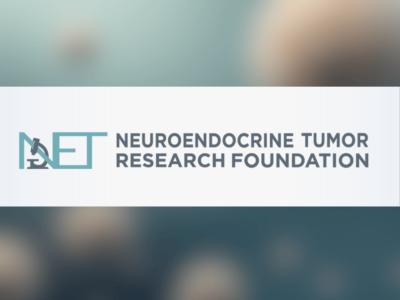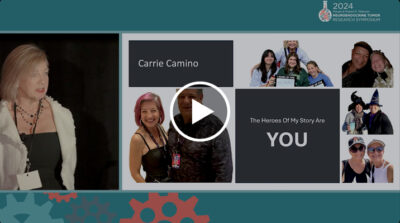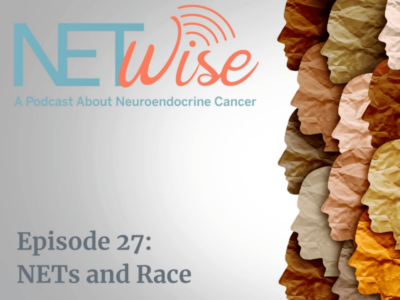

This year marks the Neuroendocrine Tumor Research Foundation’s 20th anniversary.
Established as the Caring for Carcinoid Foundation by Nancy Lindholm in 2005, NETRF has served as one of the few funding sources for neuroendocrine cancers since its inception.
When Lindholm was diagnosed with metastatic neuroendocrine cancer at 29 years old, she was told she had only a few months to live. At the time, neuroendocrine tumors (NETs) were underresearched and underfunded.
With few options, Lindholm pushed for change, focusing her foundation on funding research to identify new treatments and, ultimately, a cure.
Since 2005, NETRF has awarded nearly $40 million across over 150 grants, dramatically changing the funding landscape of this uncommon disease.
NETRF grants have fueled discoveries such as classifications of distinct lung neuroendocrine tumor subtypes, the presence of “persister cells” that evade treatment in extrapulmonary neuroendocrine carcinoma tumor samples, and epigenetic differences contributing to racial disparities in pancreatic neuroendocrine tumors.
In an article accompanied by a timeline and video published in The Cancer History Project, NETRF writes:
Twenty years ago, Nancy Lindholm, stunned by a diagnosis of neuroendocrine cancer, gathered a small group of volunteers and researchers to establish the Caring for Carcinoid Foundation. The mission then, as now, is to find treatments and cures for neuroendocrine cancer. In 2015, the Caring for Carcinoid Foundation became the Neuroendocrine Tumor Research Foundation to reaffirm and strengthen its focus on research, beginning a period of tremendous growth marked by $40 million raised and 8 new treatments.
“Over these 20 years, we have created a highly productive global community of neuroendocrine cancer scientists who share resources, collaborate on projects, and train the next generation of researchers,” says Elyse Gellerman, MHS, Chief Executive Officer of the Neuroendocrine Tumor Research Foundation. “We have invested almost $40 million to understand tumor biology, support translational research that is resulting in new treatments, and bring hope to patients and their families around the world.”
Read more and view the video on the Cancer History Project.
We have invested almost $40 million to understand tumor biology, support translational research that is resulting in new treatments, and bring hope to patients and their families around the world.
Elyse Gellerman
Recent articles by NETRF


VIDEO: Carrie Camino, neuroendocrine cancer thriver, speaks at the 2024 NETRF Symposium, Nov. 13, 2025
‘Get busy living’ is Carrie Camino’s call to action and the lens that she uses to determine where to spend her time in order to make an impact. Her vision and journey is documented in the linked video.
Carrie Camino joined the NETRF Board of Directors in April of 2024. Carrie is a retired business consultant and partner with West Monroe Partners where she was responsible for relationship management and service delivery for Fortune 100 companies in the life science and insurance industries. She was an advisor to client boards and executives for business value creation and led high-performance teams driving strategic growth, risk exposure and mitigation, and operational agility. She has a deep-seated passion for patient education and advancing NETRF’s research mission. A proud Loyola University alumna, she also holds a master’s degree in information systems from DePaul University. Recently retired, Carrie is an avid sailor and a member of the Chicago Yacht Club. She lives in the Greater Chicago area with her husband and daughter.


NETWise Episode 27: NETS and Race, Nov. 12, 2025
We hear a lot about the need for diversity and inclusion in health care, and we know there is a need for more diversity in NET clinical trials. Regarding race and medicine, four significant factors influence health outcomes and deserve scientific investigation. First is your genes and your specific ancestry. Second is epigenetics, which is the study of how your behaviors and environment can cause changes that affect the way your genes work. Third is how you are treated by others, especially how you are treated by health care staff, institutions and systems in your setting. Fourth is the physical environment you live in, your family and your community. Listen to this newest NETWise podcast as we take a look at these factors with the experts and talk and learn more about NETs and race.
The Cancer History Project is a free, collaborative archive of oncology history that aims to engage the scientific community and the general public in a dialogue on progress in cancer research and discovery.
This project is made possible with the support of our sponsors: the American Society of Clinical Oncology, the University of Texas MD Anderson Cancer Center, ACT for NIH, UK Markey Cancer Center, Rutgers Cancer Institute of New Jersey/RWJBarnabas Health, The University of Kansas Cancer Center, and the National Comprehensive Cancer Network.
The Cancer History Project is an initiative of The Cancer Letter, and is backed by 60 partners, spanning academic cancer centers, government agencies, advocacy groups, professional societies, and more.
Interested in learning more about the history of oncology? Subscribe to our monthly podcast on Spotify or Apple Podcasts.





